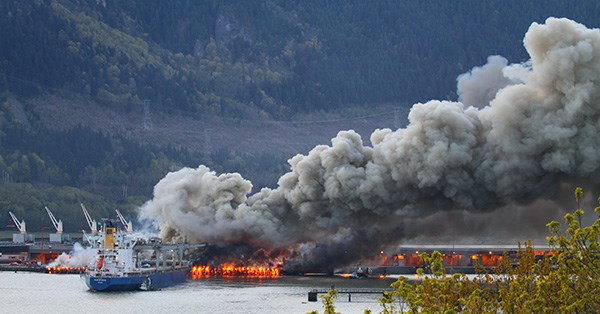The air quality risk to public health is low following the Squamish Terminals fire Thursday evening, says the medical health officer.
“If you are not experiencing any respiratory distress as a result of it, you should not be frightened,” Dr. Paul Martiquet of Vancouver Coastal Health said in an interview with The Squamish Chief on Friday. “An acute exposure to wood smoke with creosote is not going to be a health hazard in the long term.”
He added, however, that anyone exposed to the heavy smoke over Squamish Thursday evening “who experiences difficulty breathing, particularly those with underlying lung problems such as asthma or emphysema, should seek medical attention immediately.”
Squamish residents had been advised Thursday evening to stay inside, when the plume was over Squamish and heavy in the downtown core. “So if you were smelling wood smoke in the air, we advised people to stay inside.”
But the “shelter-in-place” precaution was lifted Friday morning, he said. “People can continue their business as usual.”
Wood smoke is carcinogenic, or cancer-causing, said Martiquet, who advises people not to expose themselves to wood smoke including at bonfires.
“The wood smoke that people inhaled would have been a concern… It does have carcinogens in it.”
The smoke also included creosote, with which the dock at Squamish Terminals had been treated, authorities have confirmed.
Creosote, however, “is more dangerous if you eat it or swallow it,” said the medical health officer. “The whole idea of what the risk is here is that the it is wood smoke, and wood smoke includes particulate… an irritant to the lungs.”
The smoke included light tar or polyaromatic hydrocarbons, because the wood pilings had been dipped or soaked in the creosote, or tar, he explained.
He does not expect significant long-term health effects from the fire for people living in Squamish.
“In the long term, I think we are going to be fine,” Martiquet said. “It is the environmental effects that linger that might pose problems to marine life.”
He said Squamish residents are lucky to be on a groundwater system and not surface water, “so water will not be contaminated for Squamish.”
As of Friday morning, the wood smoke has been dispersed, he added, but he cautioned that the situation can change if the fire flares up again. As of mid-morning Friday, there was still heavy smoke from the fire, which officials said was 90 per cent extinguished.



